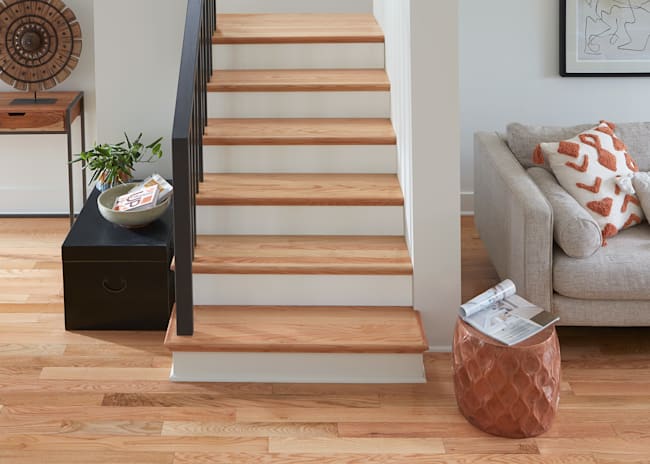- Home
- Education
- Flooring Basics
- What is a Floating Floor?
What is a Floating Floor?
A 'floating floor' is not attached to the subfloor beneath it with glue or nails. It is not a type of material, but a method of installation.
A 'floating floor' is not attached to the subfloor beneath it with glue or nails. It is not a type of material, but a method of installation.
When you hear about different installation methods, the two most common that you probably hear are 'glue down' and 'nail down.' Nail down is often used for 3/4" hardwood over a wooden subfloor. Glue down is great for a product that has a thinner profile or for being applied over cement (Expert tip: Don't forget a highly rated moisture barrier in these cases.)
The other type of installation is a 'floating floor.'
Not sure how a floating floor works? Well, floating floors generally click or snap together and 'float' above the sub-floor instead of being nailed or glued into place.
Floating wood floors make an excellent choice over radiant heat, concrete, linoleum, and hard-to-remove surfaces. Another advantage of floating floors, if they are of the click variety, is that the flooring can be pulled up an used somewhere else.
Not all floating floors click together, however. Some floating floors require a tongue & groove adhesive so that they will stay together after you have installed and won’t shift.
When choosing your floor, check with your local staff so they can help you understand which products click together and which will need to be glued.
All of of LL Flooring's Laminate floors, most of our Vinyl Plank and Engineered Hardwood floors, and all of our real-wood Hybrid Resilient Duravana flooring can be used as floating floors.
If you're not sure a floating floor is right for you, speak with the team at your local LL Flooring location.
Use this Store Locator to find your nearest location.
Every flooring expert is happy to help decide what is best for your application and project. If you want to tackle the project #DIY they’ll help you with tips & tricks to laying your own floor beautifully.
The video below shows a quick demo of the varieties of floating floors with click-installation.



